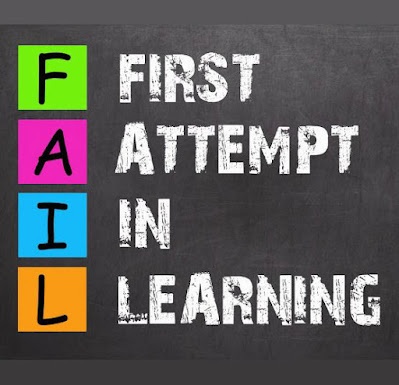Failure is Not the “F” Word
No one likes to fail. It stings, and it requires strength to try again. This strength is a character trait that develops over time with the right attitude toward failing. Do you embrace failure in your life and your teaching, or does failure disappoint and discourage you?
There is much discussion these days about the value of failure in learning, and most importantly the value of analyzing what went wrong, and finding ways to correct it next time. Let’s be honest, we fail at something almost every day. It might be something small, but we make those mental notes about what not to do next time. That’s learning! Learning comes from failing, not succeeding. When we succeed, we breathe a sigh of relief, but we don’t learn anything. Learning is making continuous improvements toward a goal, it’s almost never doing something right the first time. According to an article from Oxford Learning in December 2020, “Failure is a part of learning. While the idea of failing can seem scary, it helps students develop learning skills, boost their sense of determination, and build self-esteem. Failure is an opportunity to grow.”Being afraid to fail is so much worse than failing. The fear of failure keeps us in our place; it keeps us from participating and realizing our potential. Many years ago I was talking to a neighbor who was a Harvard graduate and an ex-Top Gun navigator. We were talking about my husband's struggles with calculus, and I said, “Do you really think he can do it, or should he quit?” My neighbor, Ray O’Hare, said, “Of course he can do it. Have you never tried something that was so hard that you kept failing at it?” I said, “No, I haven’t” and he looked at me and said, “Well, that’s sad. You have no idea what you can really do then.” I’ve never forgotten Ray, or that conversation, because it altered my attitude about failure. Believing that failure is expected, and an integral part of learning, allows us to learn the qualities of perseverance and effort that are so desired. When I used to teach face-to-face public speaking courses, I started by writing on the board, “No speech is perfect, and I don’t expect yours to be.” Effort is what feeds learning. Taking chances and trying new things feeds growth. Fear of failure feeds paralysis and stagnation.
Consider the idea of embracing failure in your courses. Set your assignments up to require revisions. Communicate to students that a perfect score the first time is not the goal, but rather improvement, effort, and growing is. Make your grading practices reflect this attitude toward failure. Possibly discuss failure right up front in your courses. Maybe even offer some personal failure stories so that students know they can fail and still end up successful–like you. Let your students know that everyone can succeed who keeps learning from their failures, standing back up, and trying again. These are the lessons of great teachers.
"Only those who dare to fail greatly can ever achieve greatly."
- Robert F. Kennedy

This is interesting. Seems to be something that is of interest all over the place. We used to call it mastery learning--which allows students to fail and get to try again but with consequence. The video I link below applies to this but puts more of the weight on the learner. We always want to make it the faculty's sole responsibility to somehow get students to learn but this video says, hey as a student it is okay to fail alongside building a class to allow failure without consequence. In math, I believe there has to be consequences at some point because of the number of things a math course requires us to make sure students have mastered in order for them to survive future classes.
ReplyDeletehttps://youtu.be/9vJRopau0g0
That is a great video! It's also a fantastic perspective on life. Thank you for sharing it. I agree with your point that faculty are not solely responsible for student learning--maybe not even mostly responsible. Faculty are responsible for the learning environment, that is what we can control and adjust to promote more learning.
ReplyDelete